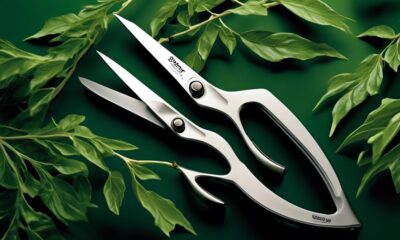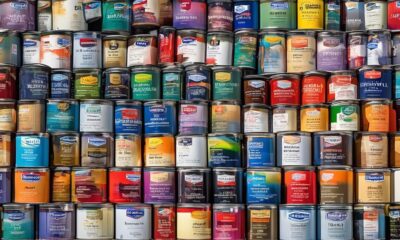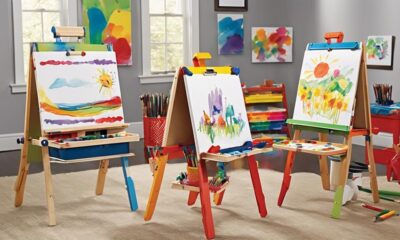Beginners Guides
How to Paint Cups
2025
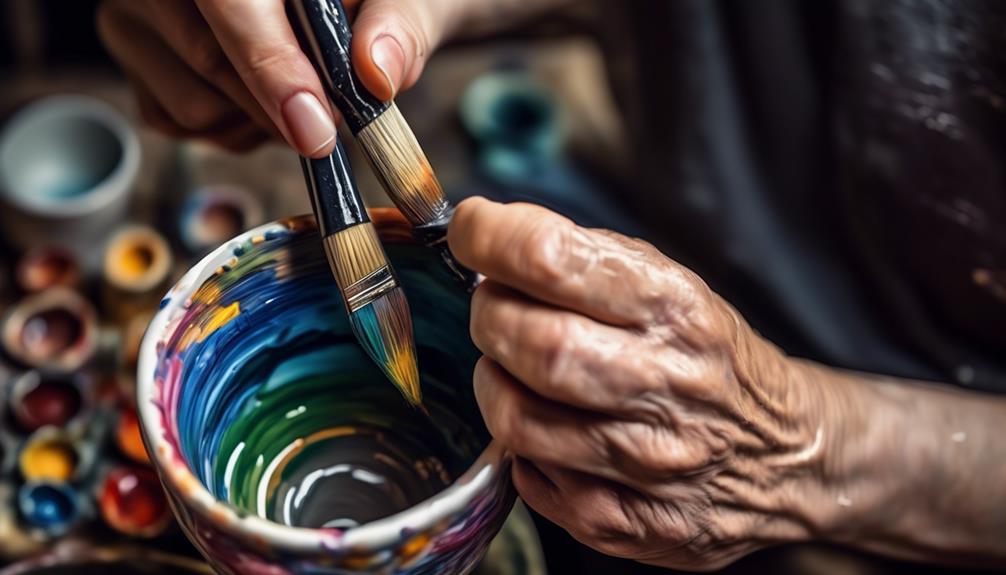
When it comes to adding a personal touch to everyday items, we are often attracted to the concept of customizing our cups. There is something unique about enjoying a drink from a mug or a tumbler that has been turned into a one-of-a-kind piece of art.
But how do we go about achieving that? Well, let's just say it involves a few key steps and a whole lot of creativity. Whether you're a seasoned artist or simply looking for a new hobby, the process of painting cups is an enjoyable and rewarding endeavor.
Key Takeaways
- Consider material, size, and shape for optimal performance and ease of use
- Prepare the surface by sanding and cleaning the cup before painting
- Choose the right paint and supplies, such as acrylic or enamel paints and appropriate brushes
- Apply paint using techniques like stenciling, blending colors, and experimenting with brush techniques
Selecting the Right Cups for Painting
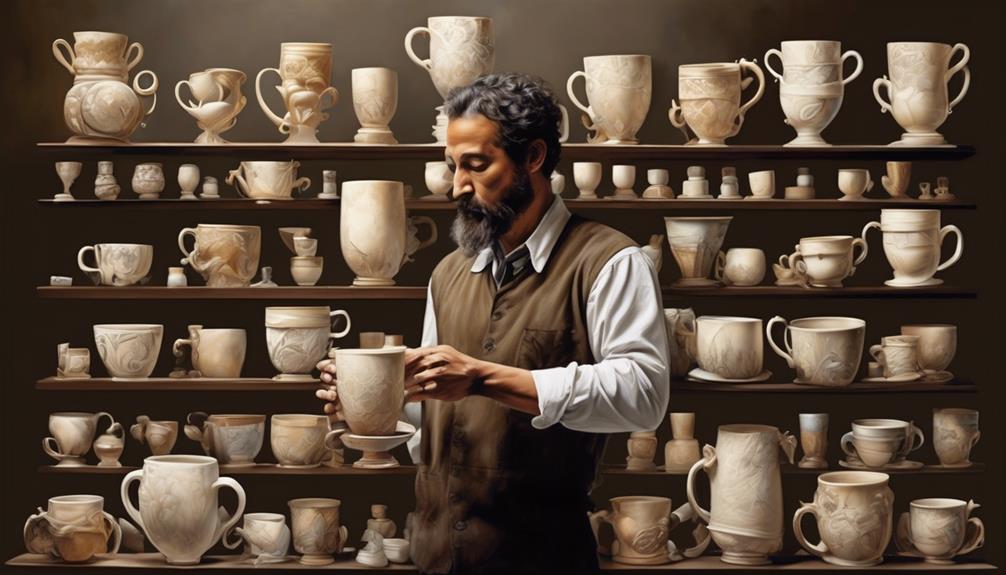
When selecting cups for painting, it's essential to consider their material, size, and shape to ensure optimal performance and ease of use.
First and foremost, durability is crucial. Look for cups made from sturdy materials like ceramic or porcelain to ensure they can withstand the painting process without chipping or cracking. Additionally, eco-friendly options such as bamboo cups aren't only durable but also sustainable choices for environmentally conscious artists.
The size of the cup is also a critical factor. For larger projects, consider cups with a greater capacity to hold more paint, reducing the need for frequent refills. Conversely, for intricate or detailed work, smaller cups may be more suitable to minimize paint wastage.
Furthermore, the shape of the cup can impact the painting experience. Cups with wide mouths provide easy access for brush manipulation and cleaning, while those with tapered spouts enable precise pouring and controlled distribution of paint.
Lastly, when customizing cups for painting, consider personalizing designs to reflect individual style and creativity. This not only adds a personal touch but also helps in distinguishing between different paint colors or types.
Preparing the Surface for Painting
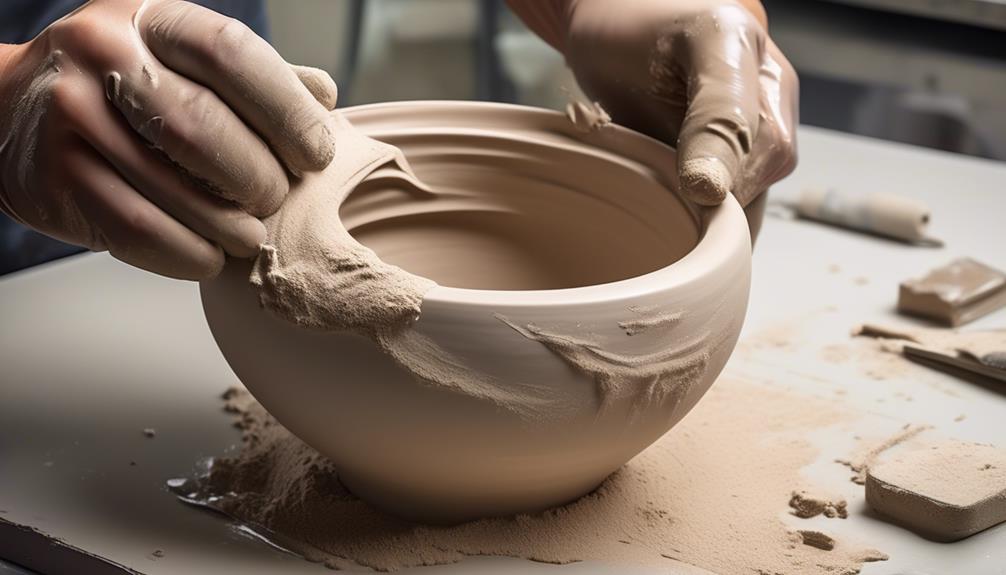
After selecting the right cups for painting, it is crucial to prepare the surface for painting to ensure proper adhesion and longevity of the artwork. The preparation process involves two main steps: preparing materials and cleaning the surface. Firstly, gather the materials needed for surface preparation, including fine-grit sandpaper (320-400 grit), a clean cloth, mild dish soap, and water. The table below outlines the step-by-step process to prepare the surface for painting:
| Step | Description |
|---|---|
| Step 1: Sanding | Use fine-grit sandpaper to lightly sand the cup's surface. |
| Step 2: Cleaning | Wipe the cup with a cloth dampened in mild soapy water. |
| Step 3: Rinsing | Rinse the cup thoroughly with clean water. |
| Step 4: Drying | Allow the cup to air dry completely before painting. |
| Step 5: Inspection | Inspect the surface for any remaining dust or residue. |
Properly preparing the surface for painting ensures that the paint will adhere well and create a durable finish. These preparatory steps are essential for achieving professional and long-lasting results.
Choosing the Right Paint and Supplies
To ensure a successful painting process, it's crucial to carefully select the appropriate paint and supplies while considering the specific requirements of the cup surface. When choosing paint for cups, it's important to consider the type of paint and the finish. Acrylic paints are a popular choice for painting cups due to their durability and ability to adhere well to various surfaces.
Additionally, consider using enamel paints for a glossy finish or matte paints for a more subtle effect. It's essential to select brushes of appropriate sizes and types for cup painting. Fine, small brushes are ideal for intricate designs, while larger brushes are suitable for broader strokes.
When using brushes, consider techniques such as stippling, sponging, or masking to create different effects on the cup surface. Stippling involves applying paint with a stippling brush to create a textured look, while sponging can create a mottled or gradient effect. Masking involves using tape or stencils to achieve clean, precise lines and shapes.
Applying Paint to Create Stunning Designs

Having carefully selected the appropriate paint and supplies for cup painting, we can now focus on applying the paint to create stunning designs that elevate the overall aesthetic of the cups. When it comes to creating intricate patterns and blending colors, it's essential to have a steady hand and a keen eye for detail. One effective method for achieving precise designs is by utilizing stencils. Stencils provide a structured way to apply paint and can help ensure that your designs are uniform and symmetrical. Additionally, experimenting with different brush techniques can add texture to your designs, making them visually striking and unique. By varying the pressure and motion of your brush, you can create depth and dimension within your designs, adding a tactile element to the cups. To assist you in understanding the various techniques for applying paint to create stunning designs, refer to the table below:
| Technique | Description |
|---|---|
| Stencil Application | Using stencils to create precise and uniform designs |
| Blending Colors | Mixing and blending colors to achieve smooth transitions and gradients |
| Brush Texturing | Experimenting with brush techniques to add depth and texture to designs |
Finishing Touches and Curing the Paint
Upon completing the application of paint, the next step involves adding finishing touches and initiating the paint curing process to ensure the longevity and durability of the designs on the cups.
First, it's crucial to employ proper drying techniques to avoid smudges or imperfections. Place the painted cups in a well-ventilated area with moderate temperature and low humidity to facilitate even drying. Avoid direct sunlight as it can cause the paint to dry too quickly, leading to cracking or fading. Additionally, rotating the cups periodically during the drying process helps prevent any potential sticking to the surface they're resting on.
Next, sealant application techniques are essential for protecting the painted designs. Choose a sealant specifically designed for the type of paint used, such as acrylic or enamel. Apply the sealant evenly using a soft brush or spray in a well-ventilated area, following the manufacturer's instructions for drying times and reapplication if necessary. This step not only protects the paint from scratches and fading but also provides a glossy or matte finish, enhancing the overall aesthetic appeal of the cups.
Frequently Asked Questions
Can I Use Regular Ceramic Cups for Painting, or Do I Need to Use a Specific Type of Material?
We can use regular ceramic cups for painting, but it's crucial to ensure the material suitability. When exploring painting techniques, we must consider the porosity and texture of the cup surface, as it affects paint adhesion and durability.
Using a specific type of ceramic cup designed for painting can provide better results, as it's formulated to accept and hold paint effectively. Understanding the cup material's characteristics is essential for mastering painting techniques.
Is It Necessary to Apply a Primer Before Painting on Ceramic Cups?
Yes, it's crucial to apply a primer before painting on ceramic cups. Just like a sturdy foundation supports a building, a primer creates a strong base for the paint to adhere to the ceramic surface. This ensures that the paint won't chip or peel off over time.
Additionally, using a primer designed for ceramic surfaces enhances the durability and longevity of the painted design. Therefore, primer application is essential for ceramic cup suitability and long-lasting results.
What Type of Paint Is Best for Creating Detailed Designs on Cups?
When creating detailed designs on cups, we recommend using acrylic paint. This type of paint offers excellent adhesion to ceramic surfaces and can be easily applied with precision for intricate designs.
When choosing colors, consider the contrast between the cup and the design, as well as the final finish.
Experimenting with different painting techniques, such as layering and stippling, can also enhance the level of detail in your designs.
Are There Any Special Techniques or Tools for Painting on Curved Surfaces?
When painting on curved surfaces like ceramic cups, special painting techniques and tools are essential. It's crucial to use the right paint types and primers for adhesion and durability.
Detailed designs require precision and control, especially on curved surfaces. Curing time is important for long-lasting results.
After painting, it's important to follow proper care instructions for washing and using the painted cups to ensure the designs remain intact.
How Long Should I Wait Before Using or Washing My Painted Cups to Ensure the Paint Is Fully Cured?
We aim for optimal paint longevity and proper curing when painting cups. It's crucial to allow the paint to fully cure before using or washing the cups. Typically, we recommend waiting at least 24 to 48 hours for the paint to cure completely.
This ensures a durable finish and prevents the paint from peeling or wearing off prematurely. Patience in this step will ultimately result in a longer-lasting and more resilient painted surface.
Can I Use the Same Paint for Denim Jackets and Cups?
Yes, you can use the best paint for denim jacket on both denim jackets and cups. However, it’s important to properly prepare the surfaces and use the right techniques for each material. Consider using fabric medium for the jacket and dishwasher-safe Mod Podge for the cups for long-lasting results.
Conclusion
After following these steps, you'll be amazed at how simple and enjoyable it's to paint your own cups.
With a little creativity and the right supplies, you can transform plain cups into stunning works of art that will impress everyone who sees them.
So go ahead and give it a try – you'll be blown away by the beautiful and unique cups you can create!
- About the Author
- Latest Posts
Introducing Ron, the home decor aficionado at ByRetreat, whose passion for creating beautiful and inviting spaces is at the heart of his work. With his deep knowledge of home decor and his innate sense of style, Ron brings a wealth of expertise and a keen eye for detail to the ByRetreat team.
Ron’s love for home decor goes beyond aesthetics; he understands that our surroundings play a significant role in our overall well-being and productivity. With this in mind, Ron is dedicated to transforming remote workspaces into havens of comfort, functionality, and beauty.
Beginners Guides
The Best Time to Go on a Cruise for Perfect Weather
Sail through the maze of climate patterns to uncover the best times for perfect weather on a cruise, ensuring a memorable voyage awaits.
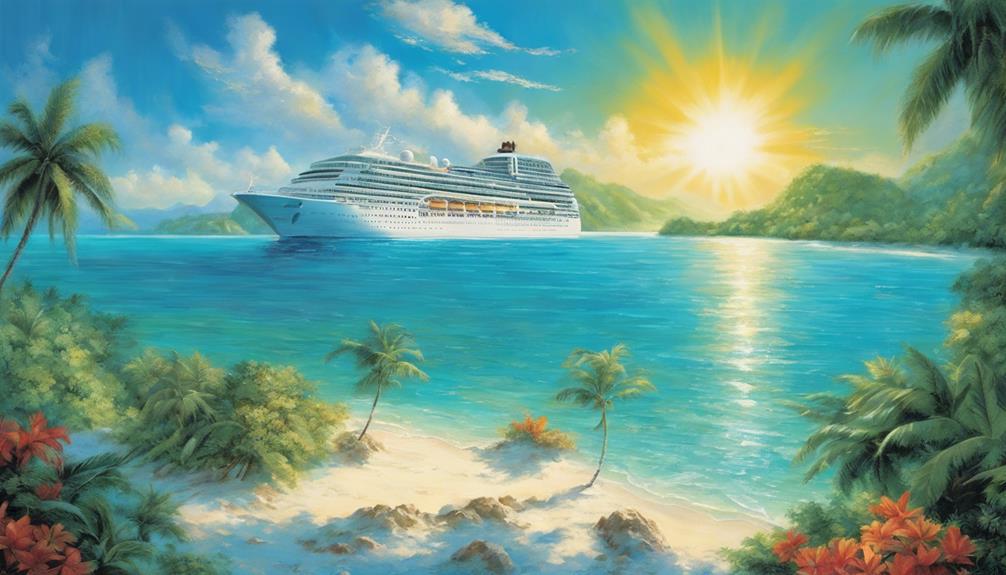
When it comes to choosing the best time to go on a cruise for perfect weather, it's like steering a maze of climate patterns to find that golden ticket. But fear not, as we have the compass to guide you in the right direction.
Understanding the seasonal nuances can make all the difference between a sun-kissed voyage and a rainy retreat. So, grab your sunscreen and pack your bags as we uncover the best times to set sail for idyllic weather conditions that will make your cruise a memorable experience.
Key Takeaways
- Caribbean cruises: December to mid-April for best weather conditions
- Alaskan cruises: Late June to mid-July for breathtaking landscapes
- Mediterranean cruises: April-May & September-October for ideal weather
- Hawaii cruises: Summer and fall months for dry weather and sunny skies
Ideal Months for Caribbean Cruises
For ideal weather conditions and a pleasant cruising experience in the Caribbean, consider booking your voyage between December and mid-April. During this period, the Caribbean boasts the best weather for cruises, with dry conditions and sunny skies prevailing. This stretch offers a fantastic opportunity to soak up the sun, enjoy water activities, and explore the stunning destinations in the region without the worry of rainstorms or excessive humidity.
Late summer into fall presents the cheapest time for Caribbean cruises, making it an excellent choice for budget-conscious travelers looking to experience the beauty of the Caribbean without breaking the bank. By opting for a cruise during this period, you can take advantage of lower prices and fewer crowds while still enjoying the warm waters and picturesque landscapes the Caribbean is known for.
Avoiding the peak season from December to April is advisable for those seeking a more peaceful and wallet-friendly experience. Sailing in late June through August allows travelers to steer clear of the crowds, particularly families on vacation during school breaks, making for a more relaxed and intimate cruise experience.
Optimal Weather for Alaskan Cruises
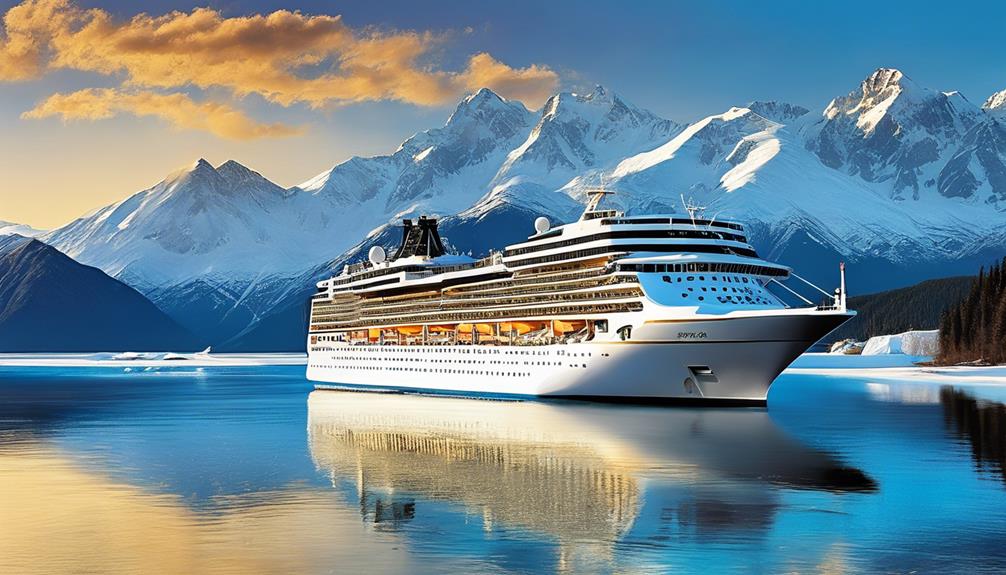
To maximize your Alaskan cruise experience, targeting late June through mid-July guarantees ideal weather conditions for enjoying the breathtaking landscapes and wildlife sightings in the region. During mid-July, you can witness the spectacular salmon run season, where various wildlife, including bears and bald eagles, gather along the rivers for this perfect phenomenon.
Late August to mid-September is another excellent window for Alaskan cruises, offering pleasant weather and often lower prices as it marks the end of the peak season. If your focus is on spotting whales, August is the prime time for your cruise, as these majestic creatures are commonly seen during this period.
For those seeking a balance between affordability and decent weather, mid-May to early June also presents a good opportunity to explore Alaska on a cruise. Keep these ideal weather periods in mind when planning your Alaskan adventure for an unforgettable experience.
Perfect Seasons for Mediterranean Cruises
April-May and September-October stand out as the prime seasons for Mediterranean cruises, offering ideal weather conditions and fewer crowds for a delightful experience exploring the region. During these shoulder seasons, the Mediterranean boasts milder temperatures and a more relaxed atmosphere compared to the peak tourist season in July and August. Traveling in April or May allows for pleasant sightseeing without the sweltering heat or overwhelming crowds. Likewise, September and October provide a serene setting for cruising with comfortable weather and less tourist congestion.
Additionally, prices for Mediterranean cruises tend to be lower from May to November, making it a cost-effective option for travelers seeking a budget-friendly voyage. Consider booking a Mediterranean cruise in May 2024 with MSC starting at $499/person to enjoy the perfect blend of favorable weather and affordable prices.
- Ideal weather conditions
- Fewer crowds
- Milder temperatures
- Lower prices during shoulder seasons
- Peak tourist season in July and August
Prime Time for Hawaii Cruises
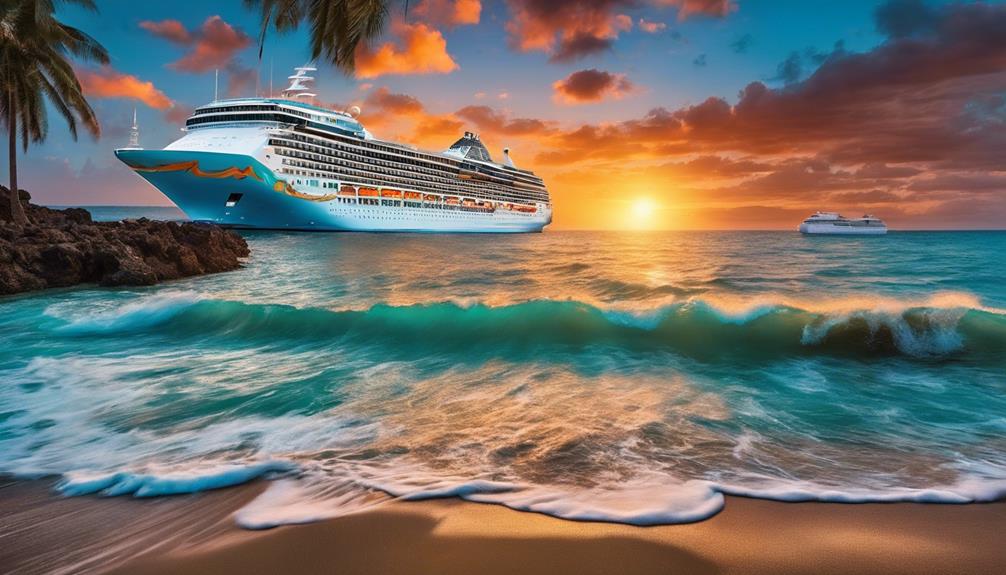
The best time to start on a Hawaii voyage is usually during the summer and fall months when the weather is dry and the skies are sunny. Hawaii cruises are particularly rewarding from mid-September through October, offering ideal conditions for a memorable experience. If you're interested in whale watching, the period from late October through May is perfect for spotting these majestic creatures in their natural habitat. During this time, the weather remains pleasant, with minimal rainfall from August through October, ensuring a smooth sailing experience.
For travelers seeking a cost-effective option, January through March can be a good time to contemplate a Hawaii cruise, although weather conditions may vary slightly. These months often offer competitive pricing and fewer crowds, allowing you to enjoy the beauty of Hawaii at a more relaxed pace. Whether you're into adventure, relaxation, or simply soaking in the stunning scenery, a Hawaii cruise during the summer and fall months promises an unforgettable journey.
Best Weather for Australia & New Zealand Cruises
For those considering voyages beyond Hawaii, exploring the best weather for Australia & New Zealand cruises becomes paramount, especially as these regions offer unique experiences throughout the year. When planning your cruise to Australia and New Zealand, keep in mind the following key points for an enjoyable voyage:
- November to March: This period offers warm temperatures and sunny weather in major ports like Sydney, making it the best time to go on a cruise in Australia & New Zealand.
- Early February to mid-March: Experience the warmest weather in Australia during these months, ensuring a comfortable cruise.
- New Zealand's Climate: With a temperate climate, layering is recommended for cruises throughout the year to stay comfortable.
- Consider Off-Peak Months: October, November, or April can provide discounted fares in Australia outside the peak season, allowing for savings on your cruise.
- Reversed Seasons: Australia and New Zealand have reversed seasons compared to the northern hemisphere, influencing the ideal timing for a cruise in these regions.
Planning your trip around these factors will help you make the most of your cruise experience in Australia and New Zealand.
Conclusion
To guarantee the best time to go on a cruise for perfect weather is essential for a memorable and enjoyable experience. By researching the ideal months for different regions like the Caribbean, Alaska, Mediterranean, Hawaii, Australia, and New Zealand, you can secure smooth sailing and sunny skies.
Don't just take our word for it, investigate the truth of this theory yourself and discover the magic of cruising in ideal weather conditions.
- About the Author
- Latest Posts
Introducing Ron, the home decor aficionado at ByRetreat, whose passion for creating beautiful and inviting spaces is at the heart of his work. With his deep knowledge of home decor and his innate sense of style, Ron brings a wealth of expertise and a keen eye for detail to the ByRetreat team.
Ron’s love for home decor goes beyond aesthetics; he understands that our surroundings play a significant role in our overall well-being and productivity. With this in mind, Ron is dedicated to transforming remote workspaces into havens of comfort, functionality, and beauty.
Beginners Guides
The Best Time to Cruise for Budget-Friendly Deals
Fulfill your wanderlust dreams without draining your wallet by learning the key to scoring budget-friendly cruise deals.
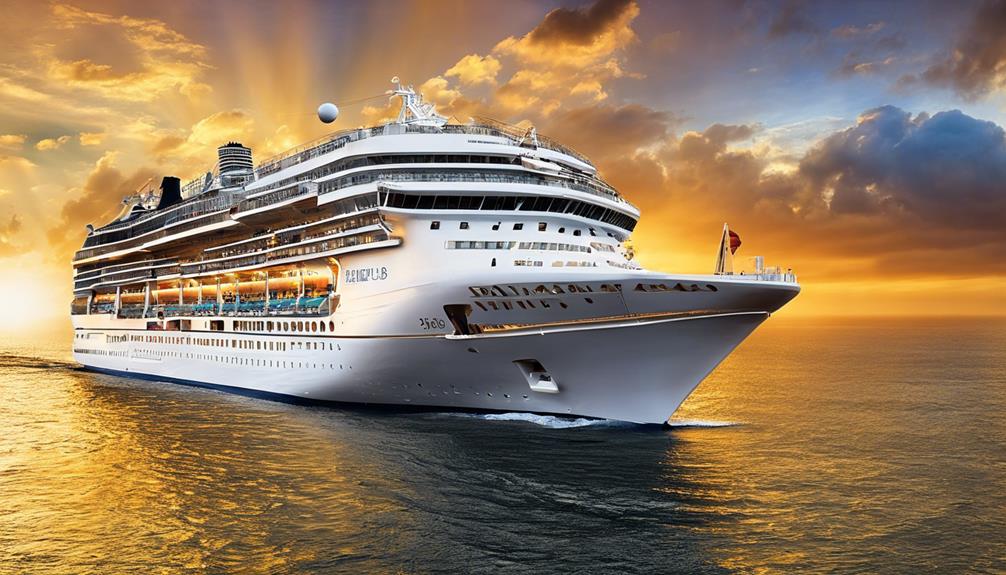
When it comes to finding budget-friendly cruise deals, timing is key. Imagine setting sail on the crystal blue waters of the Caribbean or exploring the stunning glaciers of Alaska without breaking the bank.
There's a specific window of opportunity that savvy cruisers keep an eye on to secure the best rates and save some serious cash. But how do you know when to book your next adventure to make the most of your budget?
Let's uncover the secrets behind scoring the ultimate cruise deals and making your dream vacation a reality.
Key Takeaways
- Booking during wave season in January to March ensures budget-friendly deals.
- Monitoring prices post-booking for drops leads to potential refunds or upgrades.
- Repositioning cruises in spring and fall offer cost-effective options.
- Leveraging loyalty programs maximizes savings for affordable cruising.
Ideal Seasons for Budget-Friendly Cruises
When seeking budget-friendly cruise deals, timing plays an important role in securing the best value for your money. Shoulder seasons such as September, October, and early December present excellent opportunities for travelers looking for cheaper fares. These off-peak times often offer discounted rates and fewer crowds, making it an ideal choice for budget-conscious individuals.
Additionally, booking during wave season in January and February can lead to significant discounts and promotions, maximizing savings on your cruise vacation.
Repositioning cruises during spring and fall are another fantastic option for savvy travelers seeking affordable deals. These cruises often provide cost-effective choices as cruise lines move their ships between different regions.
Avoiding major holidays and school breaks is also key to securing cheaper cruise fares and ensuring a more relaxed cruising experience. Moreover, sailing from Florida during off-peak times can offer a wide range of options and better deals for those looking to save on their cruise adventures.
Strategies for Booking Affordable Cruises
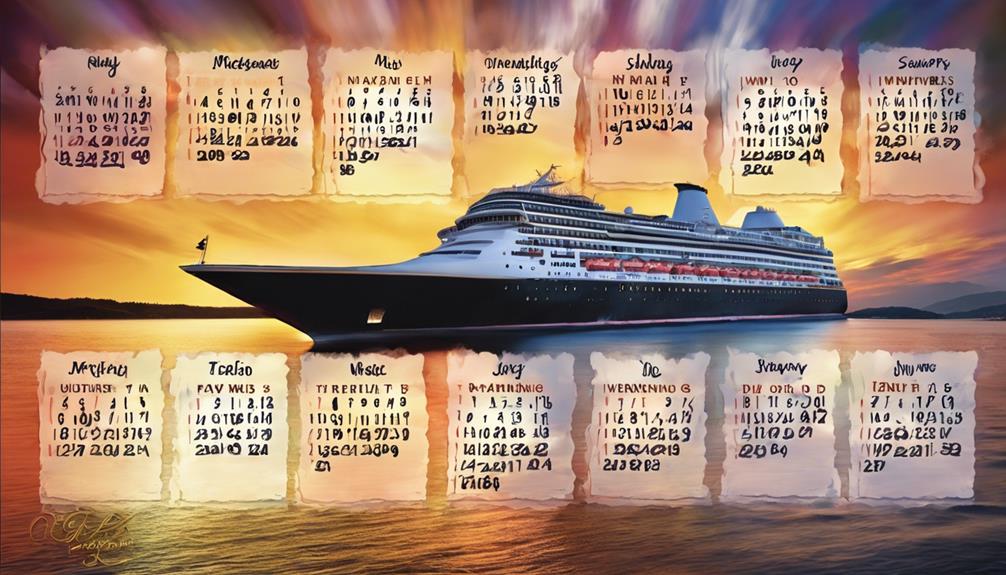
To secure the best deals on cruises, it's important to employ strategic booking approaches that maximize cost savings and value for your vacation. When aiming for budget-friendly cruise deals, consider the following strategies:
- Booking in Advance: Securing your cruise early, especially during wave season from January to March, can lead to lower rates and additional benefits.
- Monitoring Fare Changes: Keep an eye on fluctuating fares and be ready to book when prices drop to secure the best deal.
- Being Flexible with Travel Dates: Flexibility can be key in finding affordable cruise options, as adjusting your travel dates slightly can result in significant savings.
- Considering Repositioning Cruises: Exploring repositioning cruises or sailing during shoulder seasons can offer unique routes and discounted prices.
- Utilizing Loyalty Programs and Off-Peak Times: Take advantage of loyalty programs, monitor price drops, and consider traveling during off-peak times to maximize your savings on cruise vacations.
Best Times to Score Cruise Deals
During wave season from January to March, travelers can capitalize on the best times to secure budget-friendly cruise deals. Booking well in advance is key to snagging the most favorable timing and rates for your cruise.
Additionally, considering repositioning cruises during the spring and fall can offer discounted prices, making them a great option for those seeking budget-friendly deals. It's also advisable to keep an eye out for price drops even after booking, as this could potentially lead to refunds or upgrades for your cruise experience.
Leveraging loyalty programs or memberships can grant you access to exclusive discounts and savings on your upcoming cruise. By being proactive and strategic in your approach to booking and monitoring deals, you can maximize your chances of finding the best cruise deals that align with your budget and preferences.
Timing Tips for Budget-Friendly Cruises
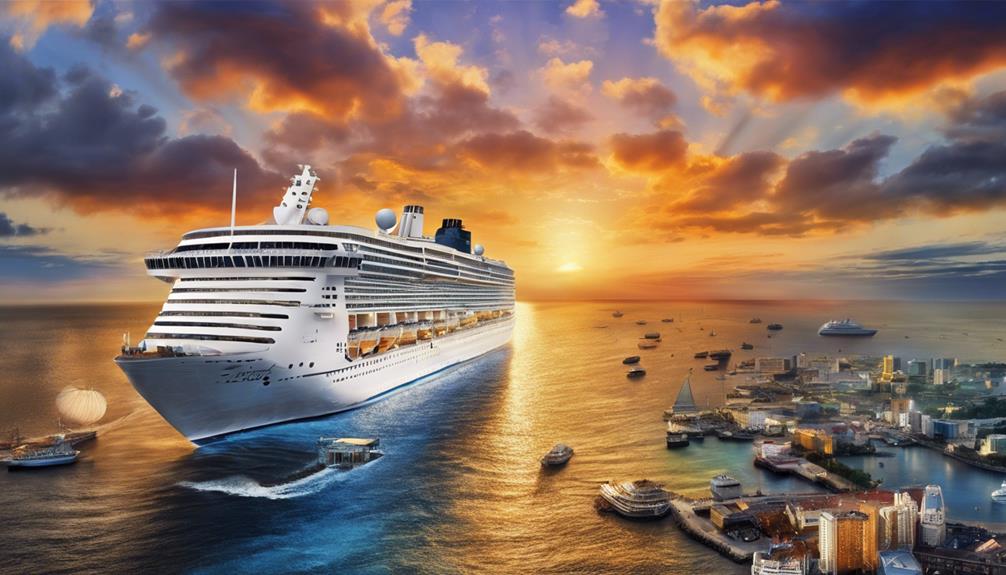
Let's explore practical strategies for maximizing your savings on budget-friendly cruises through strategic timing tips. When aiming to secure the best cruise deals that align with your budget, consider the following insights:
- Booking in Advance: Take advantage of wave season from January to March to lock in lower rates and secure desirable cabin options.
- Monitoring Prices: Keep an eye on price drops even after booking to potentially benefit from refunds or upgrades, enhancing your overall cruise experience.
- Loyalty Programs: Utilize loyalty programs or memberships to access additional discounts and exclusive perks, making your budget-friendly cruise even more cost-effective.
- Nearby Ports: Opt for cruises departing from nearby ports to save on airfare costs, enabling you to allocate more of your budget towards onboard activities and excursions.
- Discounts Galore: Embrace the array of discounts available during wave season and beyond, ensuring that you snag the best possible deal for your budget-friendly cruise adventure.
When to Book for Cruise Savings
Securing cruise savings hinges on strategic timing and proactive booking practices. To find the best deals, consider booking during wave season from January to March when many cruise lines offer enticing discounts.
Booking early not only guarantees better rates but also provides a wider selection of cabin choices. Keep an eye out for fare changes even after booking, as price drops may occur, presenting an opportunity for additional savings.
While waiting for last-minute deals can sometimes lead to the cheapest rates, this approach often comes with limited cabin availability. To stay informed about price fluctuations, utilize tools like the Shipmate app and Cruise Critic for efficient monitoring.
Conclusion
To summarize, cruising during the off-peak season can help us save some serious dough. Booking early during wave season is key to scoring those sweet deals.
So, let's set sail and make some memories without breaking the bank. Remember, early bird gets the worm – or should I say, the cruise discount!
- About the Author
- Latest Posts
Introducing Ron, the home decor aficionado at ByRetreat, whose passion for creating beautiful and inviting spaces is at the heart of his work. With his deep knowledge of home decor and his innate sense of style, Ron brings a wealth of expertise and a keen eye for detail to the ByRetreat team.
Ron’s love for home decor goes beyond aesthetics; he understands that our surroundings play a significant role in our overall well-being and productivity. With this in mind, Ron is dedicated to transforming remote workspaces into havens of comfort, functionality, and beauty.
Beginners Guides
Best Time to Go on an Alaskan Cruise for Wildlife Watching
Get ready to discover the optimal time for wildlife enthusiasts to embark on an Alaskan cruise – the ultimate season for extraordinary encounters awaits!

One could contend that any time of year is fitting for an Alaskan cruise, but if you genuinely want to maximize your wildlife watching opportunities, timing is key.
While many months offer glimpses of nature's wonders, there is a particular period that stands out above the rest.
Join us as we explore the intricacies of the Alaskan wilderness and uncover the secrets of when to set sail on a journey that promises unforgettable encounters with some of the most magnificent creatures on earth.
Key Takeaways
- Prime months for wildlife viewing in Alaska are May, June, and September.
- Peak whale watching season is from mid-June to August.
- Best time for bear spotting is between July and early September.
- Ideal months for bald eagle sightings in southeast Alaska are from May to September.
Prime Months for Wildlife Viewing
During the prime months of May, June, and September, Alaska offers the best conditions for wildlife enthusiasts to observe a diverse array of animals in their natural habitats. June marks the beginning of summer, a time when the landscape comes alive with the sights and sounds of wildlife.
July and August are ideal for witnessing brown bears fishing for salmon and catching glimpses of majestic moose roaming through the wilderness. These months provide ample opportunities for up-close wildlife viewing experiences, especially during the salmon run when bears gather along the rivers to feast.
As the summer changes into September, visitors can look forward to spotting humpback whales during their annual migration, as well as witnessing the spectacular spawning salmon and caribou herds moving across the land. The shoulder seasons offer a unique chance to explore Alaska inside and out, with fewer crowds and mosquitoes, making it an ideal time for wildlife enthusiasts to immerse themselves in the natural beauty of the region.
Peak Whale Watching Season
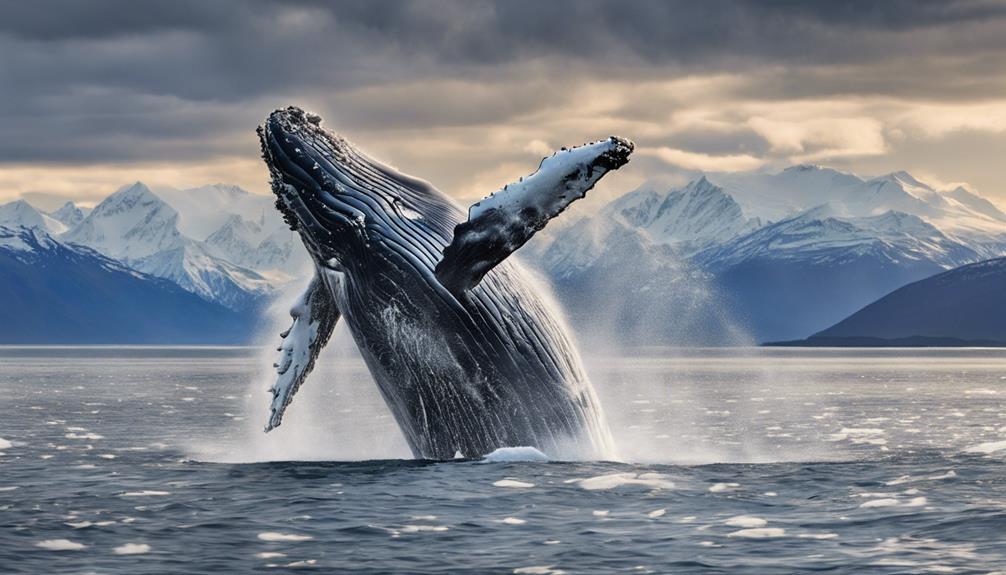
In the peak whale watching season in Alaska, which typically spans from mid-June to August, enthusiasts have the best opportunities to witness humpback whales and other species in their natural habitat. Humpback whales are commonly sighted during the summer months as they feed on small fish and krill.
Killer whales, also known as orcas, are best spotted in May and June near Ketchikan, Juneau, and Seward, hunting for seals and other marine mammals. Grey whales migrate to southern Alaska in late spring, showcasing their impressive breaching behaviors.
Blue whales, the largest animals on Earth, may be seen in July and August, traveling through Alaskan waters in search of food. Whale sightings can vary depending on the specific month of your Alaskan cruise, so choosing the right time within the peak season is important for maximizing wildlife watching opportunities while sailing through these majestic waters.
Best Time for Bear Spotting
Ideally situated between July and early September, the peak time for bear spotting in Alaska coincides with the salmon influx that attracts these magnificent creatures to the creeks and streams of the region. During this period, Grizzly bears can be observed in their natural habitat, offering a thrilling experience for wildlife enthusiasts. Royal Caribbean Cruise Tours in Alaska often include bear viewing excursions, enhancing the opportunity to witness these powerful animals up close. For best bear sightings, consider visiting during the salmon run in July, a time when bears are actively hunting for fish in creeks and streams, particularly in locations like Ketchikan. Alaska's diverse landscapes and ecosystems provide ample opportunities for bear viewing, from observing black bears to encountering majestic brown bears. Whether through guided tours or remote float plane trips, Alaska offers a range of experiences to witness these iconic creatures in their element.
| Best Time for Bear Spotting | |
|---|---|
| July | Salmon run |
| Early September | Grizzly bears |
| Creeks | Streams |
| Ketchikan | Royal Caribbean Cruise Tours |
Ideal Months for Eagle Sightings
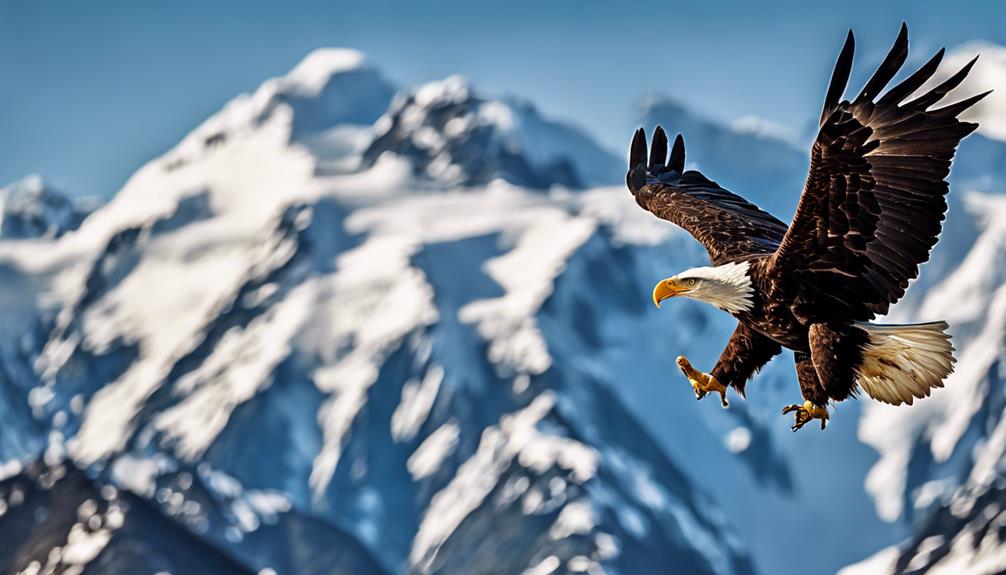
The peak months for perfect bald eagle sightings in southeast Alaska are from May to September. During these months, as part of an Alaska cruise, birdwatching enthusiasts can witness the majestic bald eagles in their natural habitat. Southeast Alaska, home to around 30,000 bald eagles, offers ample opportunities for wildlife watching, especially near bodies of water where eagles are commonly spotted.
The Sitka Cultural Discovery excursion is a great way to observe bald eagles up close, as they're frequently seen near streams and bodies of water. With approximately 470 bird species in the region, including the iconic bald eagle, Southeast Alaska provides a diverse birdwatching experience for nature lovers.
Whether soaring through the skies or perched on branches overlooking the water, bald eagles are a common sight throughout the summer months in this pristine Alaskan wilderness. For those seeking unforgettable eagle sightings and a chance to immerse themselves in Alaska's rich wildlife, visiting during the peak months offers an unparalleled birdwatching experience.
Optimal Time for Otter Encounters
Best timing for observing otters in Alaska ranges from early spring through the end of July. During this period, the chances of encountering these enchanting creatures are at their peak. Here are some key points to keep in mind for prime otter encounters during your Alaskan cruise:
- Steller sea lions: While otters are more prevalent during spring and early summer, Steller sea lions can be spotted year-round in Alaska. Keep an eye out for these majestic marine mammals as they often share habitats with otters.
- Streams and creeks: Otters are frequently seen near streams and creeks, making these areas prime locations for wildlife watching. Cruise along these waterways to increase your chances of a memorable otter sighting.
- Wildlife tours: Participating in wildlife tours in Alaska can enhance your otter encounters. These tours often provide opportunities to get up close to Steller sea lions, with otters sometimes making surprise appearances alongside them.
- Sea otters near the ocean: Whether near the ocean or inland water bodies, otters are adaptable creatures that thrive in various environments. Keep a lookout for these playful animals during your Alaskan cruise for a truly immersive wildlife experience.
Conclusion
To sum up, our investigation confirms that the best time to go on an Alaskan cruise for wildlife watching is indeed during the peak season of July.
The abundance of wildlife sightings, perfect weather conditions, and increased chances of spotting bears, whales, eagles, otters, and other fascinating creatures make July the ideal month for an unforgettable Alaskan wildlife experience.
Don't miss out on this prime opportunity to witness the wonders of nature in their natural habitat.
- About the Author
- Latest Posts
Introducing Ron, the home decor aficionado at ByRetreat, whose passion for creating beautiful and inviting spaces is at the heart of his work. With his deep knowledge of home decor and his innate sense of style, Ron brings a wealth of expertise and a keen eye for detail to the ByRetreat team.
Ron’s love for home decor goes beyond aesthetics; he understands that our surroundings play a significant role in our overall well-being and productivity. With this in mind, Ron is dedicated to transforming remote workspaces into havens of comfort, functionality, and beauty.
-

 Decor3 days ago
Decor3 days agoMaximalist Decor Explained: Embrace More Style
-

 Vetted3 weeks ago
Vetted3 weeks ago15 Best Drip Irrigation Systems to Keep Your Garden Thriving
-

 Vetted1 week ago
Vetted1 week ago15 Best Foot Massagers for Neuropathy to Soothe Your Feet and Relieve Discomfort
-

 Vetted2 weeks ago
Vetted2 weeks ago15 Best Sports Laundry Detergents for Keeping Your Activewear Fresh and Clean
-

 Vetted2 weeks ago
Vetted2 weeks ago15 Best Tall Toilets for Seniors That Combine Comfort and Safety
-

 Vetted3 weeks ago
Vetted3 weeks ago15 Best Dish Scrubbers to Keep Your Kitchen Sparkling Clean
-

 Decor3 weeks ago
Decor3 weeks agoWhat Is Eclectic Home Decor
-

 Decor1 week ago
Decor1 week agoWhere the Wild Things Are Nursery Decor
















